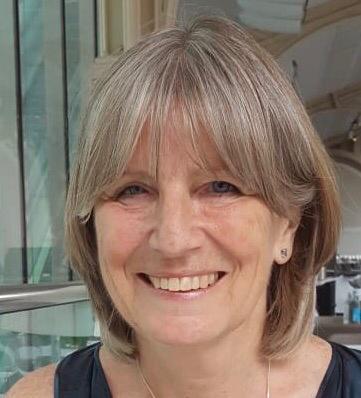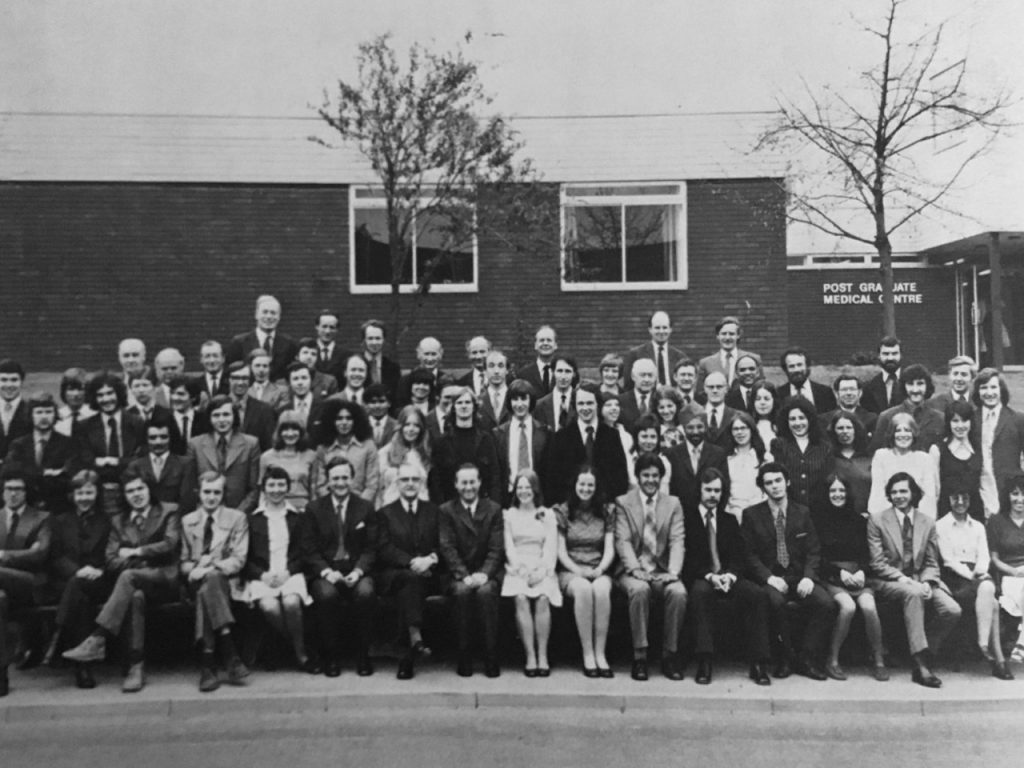December 14, 2020, by School of Medicine
50 at 50: How Dr Lindsey Davies is inspiring the next generation of doctors
I have just commenced my third year of studying medicine at the University of Nottingham, and since day one I have seized any exciting opportunities that I have become aware of. Being a clinic lead for societies, including Teddy Bear Hospital and HEARTSTART, has been very enlightening and rewarding, while my current role as President of Medics’ Basketball is proving challenging during the current COVID-19 pandemic. Furthermore, I am also transitioning into the role of Responder Administrator for the University of Nottingham First Responders, an outstanding scheme volunteering alongside the East Midlands Ambulance Service on the 999 frontline.
It will be no surprise, therefore, that when the opportunity arose to learn from, and write a blog about, a former Director of Public Health, I grabbed the opportunity. The importance of public health is becoming more and more apparent, and even at this early stage, I consider the role of Chief Medical Officer to be a future aspiration of mine. This has been further confirmed during my preparation and writing of this blog, which I hope you find interesting and enlightening, and so without further ado, let me introduce you to Dr Lindsey Davies, former Director of Public Health England.
 The University of Nottingham Medical School has produced some outstanding alumni, and no less can be said of an inspirational woman who was in the first cohort of Nottingham medical students in 1970 – Dr Lindsey Davies.
The University of Nottingham Medical School has produced some outstanding alumni, and no less can be said of an inspirational woman who was in the first cohort of Nottingham medical students in 1970 – Dr Lindsey Davies.
Lindsey is one of the friendliest people you could meet, bringing her sense of humour to interview – something she mentioned is essential for overcoming even the most difficult of situations. Becoming Director of Public Health may first seem a feat only possible to those committed to studying medicine from their early teenage years, but pre-1970, a young Lindsey Davies (formerly Lindsey Newby) had other ideas… becoming a teacher! Her passion for helping people made this appear the right path to pursue, but her thoughts were quickly changed to medicine as she realised her love for science could be combined with her desire to care for others.
1970 arrived and deciding which medical schools to apply to, Nottingham stood out to Lindsey as being new and exciting, with a prospectus all about getting out, seeing patients, and being enveloped in a world of medicine. Nottingham Medical School was also one of few at the time that was part of a campus University and mixing with a range of people is something that has always been important to Lindsey. This was perfect, as she never liked sticking to the status-quo and could not wait for the adventure.
There was a general air of excitement upon arriving at the medical school (with only 47 other students!). Lindsey remembers how spoilt they all were, and how the clinical staff encouraged contact with patients from the first week. The way Nottingham continues to put such high importance on patient contact throughout the medical course is something Lindsey believes plays a key role in the making of quality doctors.
Following University, Lindsey was unsure what to do next, eventually deciding to write to the local County Council for the School Health Service to enquire about available positions. Rather unexpectedly, she was soon appointed as a Clinical Medical Officer for schools across Nottinghamshire. Lindsey found this job wonderful and it sparked a passion for thinking about the health of communities and what could be done to improve them. For example, she set up a multidisciplinary team consisting of a vicar, a nurse, and a speech and language therapist, amongst others, to discuss families they had concerns about and what could be done to support them. This was highly valued by those involved. Lindsey’s interest in changing things for the better makes it no surprise that she was soon elected to a position on the British Medical Association Committee for Community Health Doctors.
Lindsey enjoyed being able to influence decisions and quickly got to meet lots of public health doctors, realising this was a world she wanted to be a part of, while offering a new challenge to pursue. Lindsey began to transition towards becoming a public health doctor, and really liked how it involved making changes to systems, rather than individuals, but with potentially huge benefits for people. Her skills developed quickly, leading to increased recommendations to apply for high-level positions within public health, of which Lindsey has had many.
After public health training in Nottingham, Lindsey became Director of Public Health for Derby and then for Nottingham, before ultimately moving to work in Leeds as Director of Public Health for the NHS Executive. Here, she had a pivotal role in embedding clinical audit in the NHS, initiating work on clinical outcomes, and implementing the Department of Health’s national public health strategy in the NHS. Following a national reorganisation of the NHS – one of many during her career – Lindsey became Regional Director of Public Health (RDPH) and Regional Medical Director for South Yorkshire and the East Midlands. This position became a civil service post several reorganisations later and as such, involved Lindsey in public health decisions for the UK, requiring a lot of communication with senior government ministers, as well as closely working with the Chief Medical Officer. Out of her many achievements within this remit, Lindsey set up clinical governance for the Civil Service. To her surprise, in 2006, she was asked by the Chief Medical Officer to leave her RDPH role and set up and lead a team to prepare for pandemic flu. It is worth mentioning that Lindsey had never particularly enjoyed infectious disease control, had never wanted to work full time in London, and was very close to turning down the request, however, this opportunity presented yet another adventure, her passion for which persuaded her to say yes.
 Creating a detailed action plan for pandemic flu was an immense task, and despite the preparations not being quite complete when the 2009 swine flu pandemic struck, Lindsey’s team adapted quickly to the emergency. Reflecting on this period of her life, Lindsey realised that it taught her a lot of leadership lessons, in particular, knowing the strengths and limitations of those you are working with, playing to strengths where possible. As the swine flu pandemic drew to a close, Lindsey was asked to stand for election as President of the UK Faculty of Public Health, the professional body that sets and maintains standards for public health practice. To her surprise, she was elected and unexpectedly found herself leading the profession through a major reorganisation of the NHS and public health in England. This proved to be one of the most challenging roles in her career.
Creating a detailed action plan for pandemic flu was an immense task, and despite the preparations not being quite complete when the 2009 swine flu pandemic struck, Lindsey’s team adapted quickly to the emergency. Reflecting on this period of her life, Lindsey realised that it taught her a lot of leadership lessons, in particular, knowing the strengths and limitations of those you are working with, playing to strengths where possible. As the swine flu pandemic drew to a close, Lindsey was asked to stand for election as President of the UK Faculty of Public Health, the professional body that sets and maintains standards for public health practice. To her surprise, she was elected and unexpectedly found herself leading the profession through a major reorganisation of the NHS and public health in England. This proved to be one of the most challenging roles in her career.
The pandemic flu plan has now been drawn upon in response to the ongoing Covid-19 pandemic, primarily with reference to the infrastructure, resources, and relationships that need to be in place. Lindsey’s extensive experience has resulted in being called out of retirement to assist the Government with the Covid-19 pandemic, currently working on ways to improve testing. Some of her experience is most likely also being used by Deputy Chief Medical Officer Jonathan Van-Tam, another Nottingham alumnus, whom she trained in his early career.
Amidst this, Lindsey somehow found time to volunteer with WHO, in Kosovo. She recalls the dreadful situation she witnessed, around the turn of the millennium, and how it was unlike anything she experienced before. The healthcare system in Kosovo was collapsing; the professionals fleeing to safety, taking medical equipment with them. Nevertheless, Lindsey was successful in assisting a review of the health systems in Kosovo, while helping to build, and plan, a vision for the future.
I discussed with Lindsey what the overall theme of her life, and indeed this blog, was. Ultimately, we settled on the only real theme being that there is no theme! Lindsey’s life has been full of adventure and doing things that are new and different. I can only hope I have done her justice in my writing.
Lindsey advises, at the very least, to take a good look through open doors. You would be surprised what you can achieve and how much you can adapt by rolling up your sleeves and getting stuck-in. Remember to develop different aspects of your life, as you never know when, for example, your passion for gardening can suddenly become useful in relating to a patient. Finally, do not be afraid to take the big steps, enjoy the journey, but ensure to keep a good sense of humour along the way!
By Calum Heslop


Congratulations Lindsey on a great career! Getting UK ready to face this current pandemic, well done. Hope to see you at the next reunion
What a super blog and how inspiring to hear detail on Lindsey’s career. As a local GP I recall that she always had the respect of colleagues and was seen to talk to “truth to power”.
Well done!
Lyndsey lovely to read your story again. We shared an incredible opportunity for learning in Nottingham’s early days. Congratulations